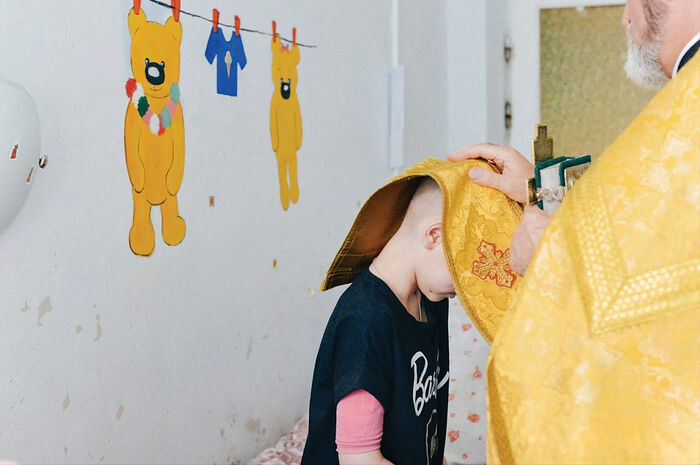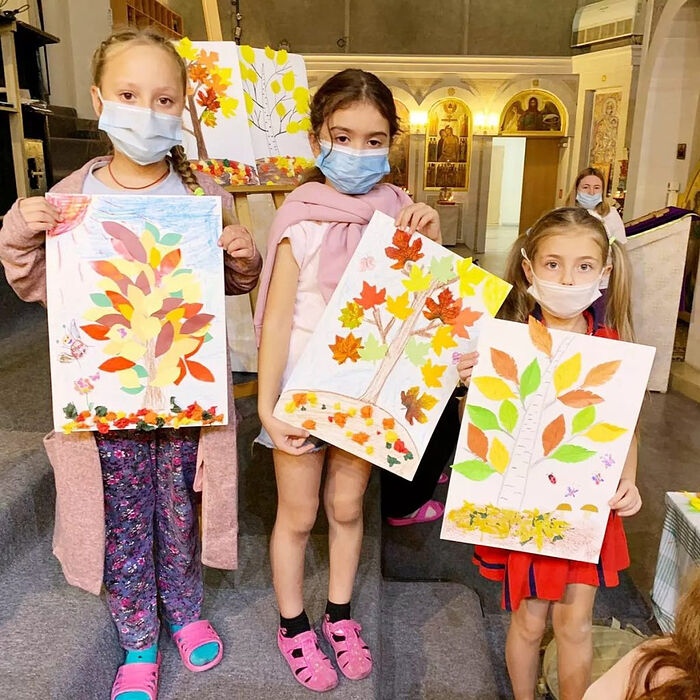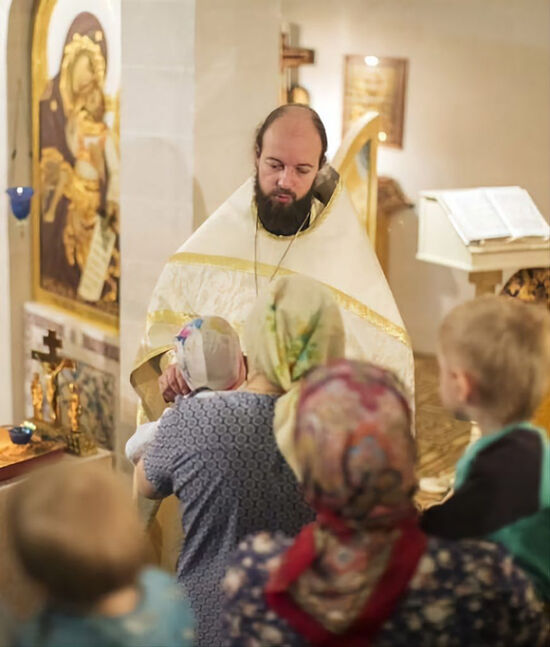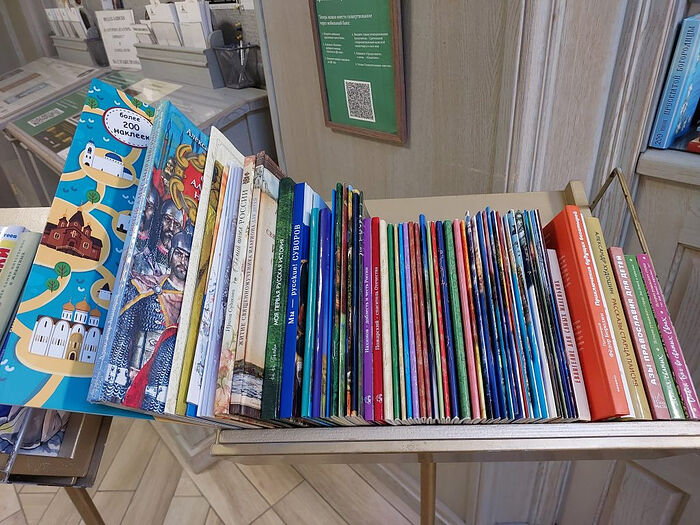The Moscow Sretensky Monastery together with the “Children Under the Protecting Veil” project is holding a charity event until the end of December in support of children who are being treated in Moscow hospitals. Priest John Zakharov, the rector of the Church of the Protection of the Most Holy Theotokos at the Russian Children’s Clinical Hospital in Moscow and the head of the project, talks about how hospital ministry is being revived in Russia, why sometimes silence is more important than word,s and how each one of us can help seriously ill children and their parents.
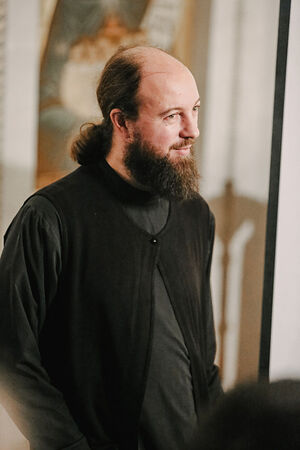 Priest John Zakharov —Father John, hospital ministry is quite typical for the Russian Orthodox Church, as well as prison ministry. But before proceeding to the project’s activities, let’s talk about the initiative behind its establishment.
Priest John Zakharov —Father John, hospital ministry is quite typical for the Russian Orthodox Church, as well as prison ministry. But before proceeding to the project’s activities, let’s talk about the initiative behind its establishment.
—I can’t agree with you, because before the Revolution churches were built at hospitals, but in 1917 they were the first to be closed. From that moment until the 1990s there was not a single hospital church. It was only thanks to such priests as Alexander Men and Arkady Shatov (now Bishop Panteleimon of Vereya) that this ministry has been revived, and not so much by the clergy as by the desire of the Church itself. The need for contact with priests among people who are treated and work in hospitals is enormous.
—When you started the project, did you face great difficulties?
—There can always be some misunderstanding, but once the hospital staff come to understand why a priest is needed, they begin to have a different attitude. After some time, the priest becomes part of this or that department or hospital, and he is no longer perceived as an outsider. This happens in all hospitals without exception, regardless of the staff’s attitudes. Everyone is a human being, and everyone’s loved ones can fall ill. When a medical institution’s administration comes to understand that we don’t sell anything, but rather give; that we don’t come ourselves, but people call us and only when it is convenient for the department, then no problems arise. If the priest behaves properly, doesn’t confuse people, does everything carefully and tactfully, then even the chief doctors who may adhere to other faiths become well-disposed to us, because everyone understands that the mental comfort of children and their parents is vital. I’ll give you an example. A priest enters the ICU, giving Communion to the children at the requests of their parents and with the permission of the administration. And when an assistant comes up and talks to the child in the ICU, the latter stops crying. I would like to add that we have been interacting with some doctors for a decade now. They first came as attending physicians, and now they are the heads of the ICU and cover for the chief doctors. Now the priest is part of the medical team.
—As far as I understand, some parents wait for a priest to come and talk to their sick children and console them. But this applies to church-going parents. But if they are not? If they are atheists, for example?
—This is a kind of service. The human soul lives according to the same laws as the body. The soul can wither and die, and in order to exist properly people (if they are believers) need to communicate with God through the Church sacraments. This is their need, and finding a priest in a hospital is primarily not a mission, but quenching the thirst of people who cannot live otherwise. People see that the priest doesn’t take money, comes when he is called, empathizes with people in grief and rejoices with them. In such a situation a suffering person is sure to be consoled. People often lack communication. People of different faiths come to us and ask us to pray for their sick children.
—Do people lack consolation, need someone’s compassion, or do they just ask you more for financial help with medicine?
—A man was in the hospital after his wife had been burned to death before his very eyes on an airplane. He had burns on sixty percent of his body, and he confessed that his physical pain was nothing compared to his mental pain. To relieve mental pain is our primary task. Requests for financial assistance are always secondary, although representatives of the Church always try to help financially, too. But our resources are limited.
—Father John, does this ministry give you strength or, to the contrary, does it drain you of energy? It’s hard to deal with people’s grief every day…
—It certainly gives us strength. You can’t compare a priest to an orderly in a morgue, through whom people’s corpses pass. These are living souls and hearts that stay with us forever. Burnout does not occur because our priests, sisters for spiritual care and volunteers support each other.
We are the Church, and our strength is precisely in the fact that we are together. When a priest goes to five hospitals, his mental strength is not enough for all; but now there are nine priests in the Moscow Morozov Pediatric Hospital alone, six priests in the Russian Children’s Clinical Hospital, two in the Sukhareva Center, and so on. If you count, we have over twenty priests going out to these medical institutions per week. Of course, this gives people the opportunity to communicate with priests more easily. There are words in the service of the blessing of a house that the house is blessed by the entrance of a priest. Just finding a priest will have an effect. People remember God and begin to pray. A priest in the hospital is in great demand, permanently. If you enter the department, it is very difficult to get out!
—Parents who come to you for help ask this very sensitive question: “Why has our child been given such a malady, and how can we endure it?” don’t they?
—They do ask, but that isn’t the most terrible question. The most difficult questions are asked by children themselves. They ask why we say that Christ died for us if He died 2000 years ago!
—How do you answer that question?
—It depends. We start with our acquaintance, which department they are in, what the diagnosis is. People very often ask this question not so much to get an answer, but rather to start some dialogue. The first time I was in the Republic’s Pediatric Hospital a woman with a dying child in her arms asked me, “What for?” Then I thought that I would give up this ministry. But that monologue turned into a dialogue, and I realized that the woman needed support, she wanted to share her grief with somebody and needed me to be with her a little. The question “what for?” is secondary. This is the form which loneliness and the feeling of being forsaken by God takes. It is not hard to answer this question scholastically: We can say that since the fall the nature of man has been spoiled and this affects children as well. But that’s not what people are talking about when they ask this question. They are asking for help and compassion. They want us to hear them out and to worry together with them.
—They want to lean on someone and hide.
—Yes. There was a story. Once after giving Communion to everyone, I was walking down the corridor in a good mood, realizing that I had served people, when a doctor literally pushed me into a ward where there were three perfectly made beds, two suitcases and a man and a woman beside them. The doctor told me that their child had been in the ICU for two weeks and was dying, and he asked me to say something to them. I certainly didn’t tell them anything—I kept quiet with them. I just wondered what city they were from and what the child’s name was. I understood that being with them, empathizing with them mattered, and we hugged and held one another’s hands. For them that moment was probably the maximum that another person could do for them.
Right till the last moment, people hope that their sick children will recover. But what happened with my involvement was a gift from God for those parents. They got a little better, as much as it is possible in such a situation. I didn’t do anything at all.
—You just lent a hand.
—Yes, I was with them.
—What do people expect from a priest now? Do they need a contact, silence, or just a helping hand?
—The most important thing is to empathize with them. You should let a person into your heart as much as possible. People feel it very much. Besides, it may not be an answer to the point, but in some halftones. If this happens informally, a person still gets comfort and joy from it.
—Father, if we turn to the text of the Gospel: This sickness is not unto death, but for the glory of God (Jn. 11:4), Jesus says. And in the Second Epistle to the Corinthians the Apostle Paul remarks that My strength is made perfect in weakness (2 Cor. 12:9).” How can you accept it with your heart?
—The Gospel is the Word of God, a Divinely inspired book. If a person opens it, the Lord Himself speaks to him. But how a person perceives it is very individual. We will not read anywhere how a person is saved. It is individual for everyone, every human being has a unique path; like snowflakes, all people are different. It is clear that if a person reads the Gospel and is drawn to Christ, the suffering and risen Christ will surely not leave him without an answer.
—Many priests say that the most terrible thing is to perform funeral services for babies and ask God that this will never happen in their lives. How do you feel about this?
—When my own child died, I said that I was ready to serve anywhere, even at the North Pole, but not in a children’s hospital. But soon I got an appointment at the Russian Children’s Clinical Hospital—one of the most difficult ones. It is called regional, but it is situated in Moscow, and children with the most complicated cases who were not helped in the regions outside Moscow are brought to it. And I’m really happy. The funeral service is certainly hard. I remember my story every time. But we must understand that the funeral service is already the end of the story. Even people outside the Church understand it. But getting a diagnosis, being transferred from the oncology department to the palliative care department is harder.
Hope is always felt in different colors, depending on what happens to a child in the hospital, on what the doctor said, on how he smiled or if he did not smile at all.
—If you read the memoirs of Archimandrite John (Krestiankin), who is especially venerated at Sretensky Monastery, he said that God is felt very keenly in prison. This probably applies to hospitals too. Have you come across this?
—Of course, I esteem Fr. John very much and fully agree with this statement. The hospital, like the prison, is a place where there is a lot of sorrow, but also a lot of joy.
—It is easier for people to live when there is hope, when seemingly hopeless patients recover. Have you ever had a story of miraculous healing?
—I try not to cling to miracles with my mind. Suppose you tell a person to wait for a miracle. But what if it does not occur? Will the person leave the Church after that? I would not talk about miracles, but about the coming of man to God. This is the greatest miracle. People convert to God in children’s hospitals, in churches, because they are loved and accepted there. While children are in the ICU, church attendants talk to their mothers in churches, trying to support and comfort them. Priests do not look at their watches when they visit children in hospitals.
—Were there people who, having come to the hospital with their sick children, eventually came to God through sorrow?
—We have been present at the Morozov Hospital for a long time. Shortly after I had become a priest there was an incident. When some boys were playing football in the yard, the goal fell on a sixteen-year-old boy. In fact, this story is not uncommon. The boy suffered very serious spinal injuries. As a result, both parents came to God and were totally transformed. They became quiet and calm. Suffering transformed them.
—Do people often get baptized in hospitals?
—Yes, we perform a lot of Baptisms.
—Yes, the Lord brings us to Himself in different ways. It’s a pity that we often convert through tribulations. It seems to me that this is the trouble of modern people. Ninety percent of Russian people are baptized, but very few are believers. Let’s switch to the joint event that our monastery and he Children Under the Protecting Veil project are implementing. What is its main purpose? And most importantly, how can each one of us help it?
—The idea was not ours. There was a desire on our part to find church people who could share in this ministry with us. It is clear that we cannot advertise, because this is an internal Church story, as it were.
We need funds in order to maintain the project. We should organize priests’, sisters for spiritual care, and a church staff unit. As a matter of principle, we do not take money from people in hospitals. Once a person has parted with his money, he sees it not as serving him, but as buying and selling. Whether he wants it or not, once money is involved, all spirituality vanishes into thin air. This is reality.
When people are in the hospital, we don’t charge for Baptisms or funeral services. But then it is not very clear how we can finance the project. We thought about it about three years ago. Then, in addition to the church at the Russian Children’s Clinical Hospital, we had several more churches in pediatric hospitals. It became clear that one priest was not enough. The name, “Children Under the Protecting Veil” had appeared much earlier. This is a volunteer service at the hospital. At some point, volunteer activity in hospitals declined, and we had to do it as a separate field in the charity volunteer service. Volunteers are in great demand in children’s hospitals. And then we created this project, and it was no longer a purely church project, but a public and volunteer one. It was quite successful.
Over time, the hospital ministry in the Miloserdie (“Mercy”) service was revived and The Children Under the Protecting Veil project as a volunteer project lost its relevance. We decided to make the project into a church one. We tried to get grants by calling priests psychologists, but it didn’t work. People need priests in hospitals, and we started looking for people who were not indifferent. We started organizing events and printing calendars. But we didn’t understand how, who or where to contact people.
But at some point, it became clear how we could organize everything properly. Where, if not in the largest Orthodox literature store—Sretenie? Probably everyone has been there personally or online. There we can tell church people about the ministry of priests in children’s hospitals, tell them about the project and ask for help.
—Father, it seems that the project is also good because it can be first a Nativity one, then a Paschal one and a Dormition one, because help is always needed. Besides, you distribute both books and hobby items. They are always useful, and for people who want to do good this is a great opportunity—and the desire to do good can be fulfilled there.
—We must also understand that almost every child stays in the hospital with his adult parent. Not only children’s literature is needed—we need books for adults, too. I am sure that the book Everyday Saints will be distributed in any quantity. There are books which will sell out quickly enough, no matter how many copies are donated.
Sretensky Monastery invites all to buy books, goods for children’s creativity or items for Church sacraments (baptismal sets, crosses, incense, lamp oil, candles) in the Sretenie bookstore. All presents collected will be handed over to children at the Morozov Hospital, the Russian Children’s Clinical Hospital and at the Sukhareva Center. They are in great demand there!
The charity event will last until December 27! Let’s support children in hospitals! You can also give presents and wish children a Merry Christmas in person by becoming a volunteer of the Miloserdie service.

